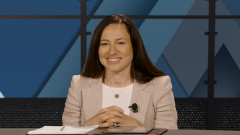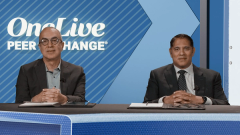
CAR T-Cell Therapy in Metastatic CRPC and Future Directions in Care
Closing out their final module, expert panelists consider the role of CAR T-cell therapy in metastatic castration-resistant prostate cancer and look toward future evolutions in the broader treatment landscape.
Episodes in this series

Transcript:
Rana McKay, MD:That’s a perfect segue into CAR [chimeric antigen receptor] T cells. Where are we there? Tanya [Dorff] presented data on PSCA [prostate stem cell antigen]. The final analysis is that it continues to see toxicity. Regarding efficacy, I don’t think there was even a single PR [partial response] reported from the trial. Are we there yet or not with CAR T therapy? There’s a lot of excitement. Sumit, what do you think about CAR T?
Sumit K. Subudhi, MD, PhD:I don’t think it’s ready for solid tumors. It’s a great option for liquid tumors. That’s because we’re talking about the microenvironment, which is so important. Carl Jones’s group published that PSMA [prostate-specific membrane antigen] CAR T with the TGFB-dominant negative, which also saw a couple of responders. When they looked at the tumor microenvironment, they saw that a lot of the CAR Ts were getting stuck in the stroma area and not making it to the center of the tumor. The microenvironment continues to be a problem. If the issue is with toxicities, you can’t combine them with anything to help the microenvironment, like cabozantinib. We’ve got a ways to go.
Rana McKay, MD:It’s been so exciting seeing all the new data presented at ASCO [American Society of Clinical Oncology Annual Meeting]. The field has been changing rapidly. We’re redefining what all these states are. Repositioning our targeted therapies, our chemotherapies, looking at novel targets. It’s an exciting time for prostate cancer, with new imaging and genomics. Thank you all for joining us on the panel. Any final thoughts from the group?
Sumit K. Subudhi, MD, PhD:I’m excited about T-cell bispecifics.
Rana McKay, MD:Arash, any final thoughts from you?
Arash Rezazadeh Kalebasty, MD:It’s been a great discussion. I don’t have much to add, but I enjoyed the discussion.
Rana McKay, MD:Scott?
Scott Tagawa, MD, MS, FACP:I’m all for more confusion—having many more diagnostics and therapeutics. It gives us more options. I’ll live with that confusion.
Rana McKay, MD:Ulka?
Ulka Vaishampayan MD:No matter what, clinical trials are what help advance things. It’s important to keep considering patients for clinical trials.
Rana McKay, MD:Thank you all for a wonderful discussion. Thank you to our audience. We hope you found this OncLive® Peer Exchange® discussion to be useful and informative. I appreciate your time.
Transcript edited for clarity.









































